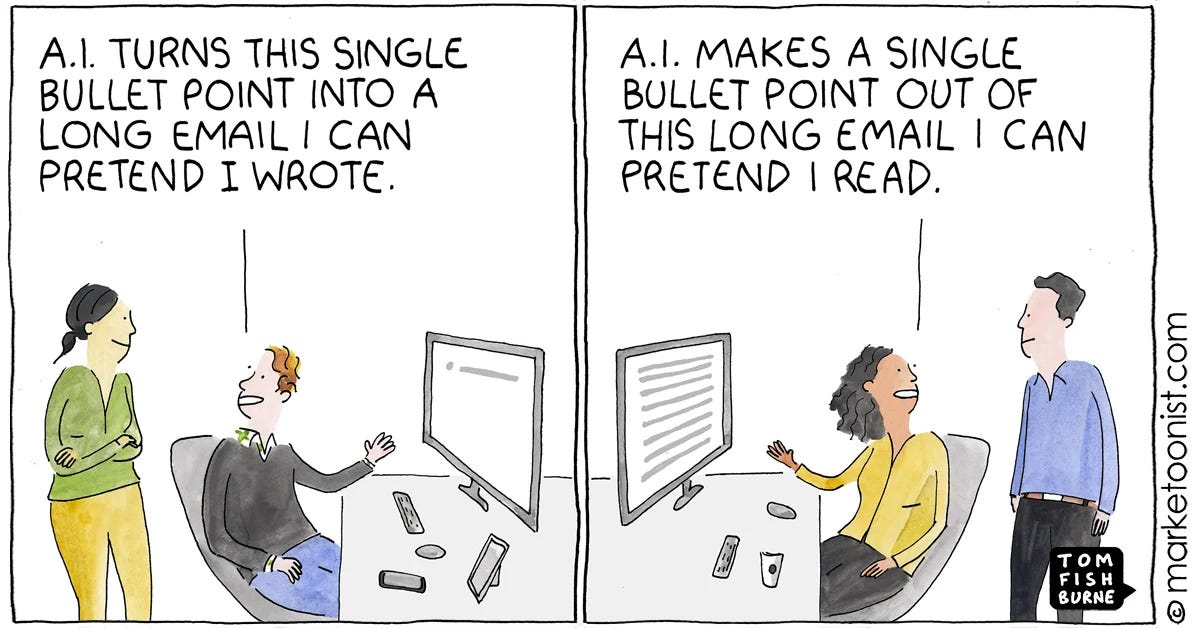You should use AI for GTM hiring. Just not how you might be thinking…
A joint post with growth guru Matt Lerner, Co-founder & CEO at SYSTM and ex PayPal/500 startups VC. Should you be banning job applicants from using AI in GTM roles? Short answer: absolutely not.
Should you ban job applicants from using AI? Hiring managers are worried. Some are even banning candidates from using AI in their job applications. That’s pretty ironic given how long companies have been using AI to filter candidates via keyword searching, but let’s leave that rant for another day.
Banning job applicants from using AI is problematic for a few reasons:
If they are bright enough, a hiring manager will not be able to tell.
They should use AI because they will need it in their jobs. Banning it would be like banning someone from using the Internet.
You can learn a lot about a candidate from how they use AI. More than you could from brainteasers or vague “tell me about a time when” questions.
The key point that most are missing? It’s not the final output that’s useful.
It’s the prompts.
Prompt engineering: the process of crafting precise instructions to guide generative AI models in producing desired outputs. An effective prompt engineer is a strong communicator who has critical thinking and subject matter expertise.
If the above sounds familiar, it’s because these are precisely the things that make for an effective GTM hire.
They must be effective communicators to talk to your customers and translate those conversations into appealing copy (i.e. language market fit)1.
They’ll need critical thinking to find the right channel to continually reach more customers and avoid the law of shitty click-through rates2 from slowing your growth.
They’ll need to be subject matter experts in your product, customers and industry to understand how to best position your product in the market.
Letting candidates use AI and assessing their prompts gives you insight into how effective they are at all of the above. It gives you an insight into their mind.
Here are 3 things you should be evaluating in a candidate’s prompts
How effectively do they communicate? Can they provide detailed context? - A good prompt should read like instructions you’d provide to a super bright but inexperienced intern with zero context. Would you be confident the intern could complete the task after reading the prompt?
Are they creative in their prompting? Do they know how to get the best out of an LLM? For example, do they provide example outputs, use chain-of-thought prompting or ask the LLM to take the time to think and provide clear roles (amongst other things suggested in Anthropic’s prompt engineering guide)?
Are they effective subject matter experts? After each output, you should see them correcting the LLM and guiding it to a better answer. For that to work, they’ll need to know what good looks like. Each iteration should provide clear guidance for how to improve the next output.
Wrap up
In short, rather than banning AI, hiring managers should embrace it for GTM hiring. We have an exciting opportunity to rethink how we work and hire, and the future belongs to those who figure out how to make these tools work in their favour.
When you find the exact right words to explain your product or service to prospective customers, words that resonate with goals and struggles that are already in their brains. When you talk about your product, a lightbulb in their heads switches on that says, “That is EXACTLY what I’m looking for” — they feel like you’ve read their minds
The Law of Shitty Clickthroughs states that over time, all marketing strategies result in declining clickthrough rates. This phenomenon describes the inevitable decrease in effectiveness of advertising and marketing channels as they mature.



